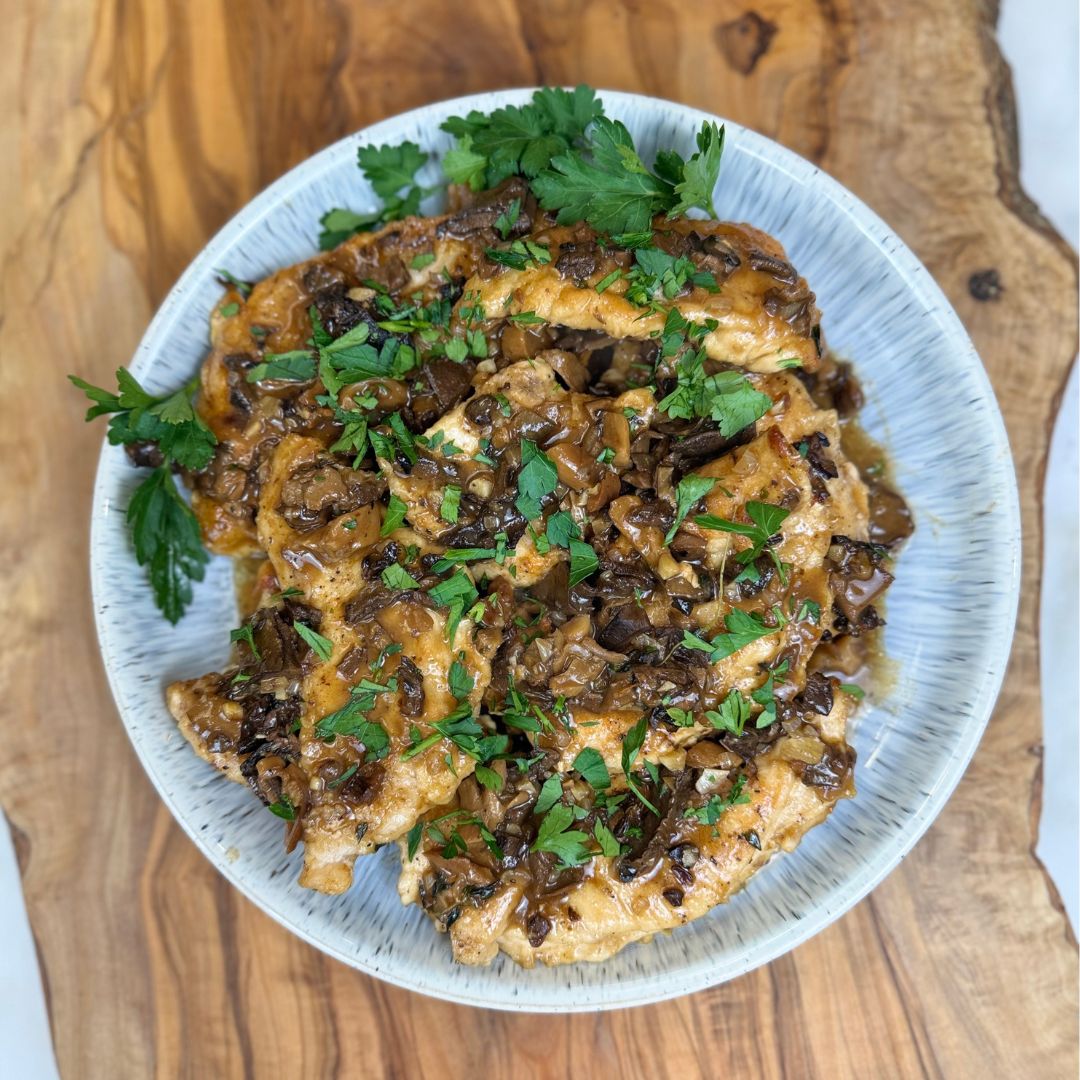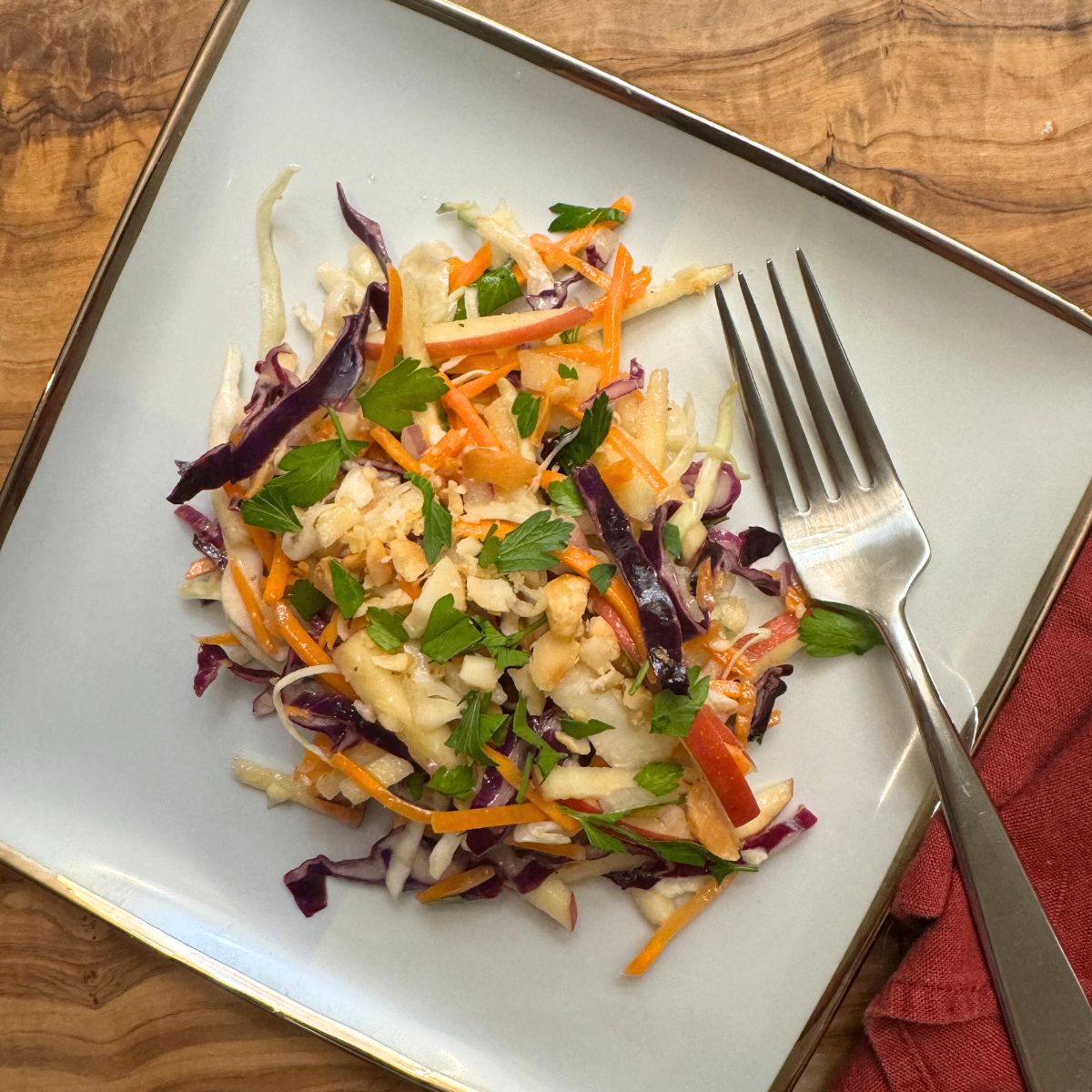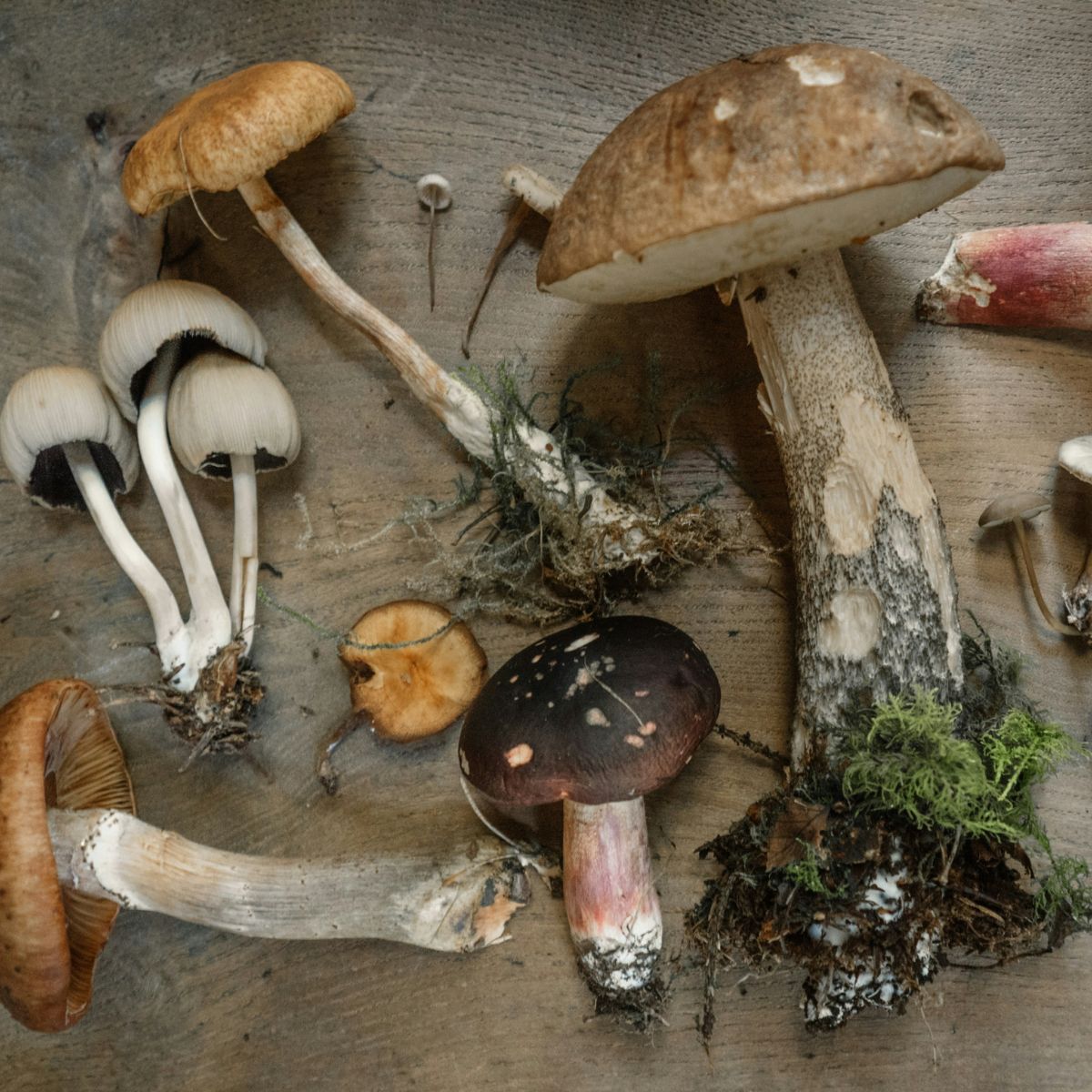
Prebiotic Power of Mushrooms
Understanding the importance of a thriving gut microbiome is crucial for maintaining our overall health, and mushrooms play a significant supporting role by contributing to a healthy balance of gut microbes.
The prebiotics found in mushrooms, such as beta-glucans and chitin, serve as food for beneficial gut bacteria. Think of the beneficial gut bacteria as the good guys in our gut and the prebiotics as their fuel.
Prebiotics from mushrooms can travel to our colon undigested, where specific beneficial strains of bacteria, such as Bifidobacteria and Lactobacilli live and feast on them.
These bacteria ferment prebiotic fibers, breaking them down into short-chain fatty acids (SCFAs) such as acetate, propionate, and butyrate. SCFAs are essential for maintaining the health of the colon cells and have numerous beneficial effects on gut function and overall health.
Recent research has revealed how glucose, galactose, mannose, and fucose found in mushroom polysaccharides can improve the composition of gut microbiota. (1)
Additionally, the fermentation process produces gases and byproducts that create an acidic environment in the colon, hindering the growth of harmful bacteria.
By nourishing beneficial gut bacteria, prebiotics in mushrooms help support a diverse and balanced gut microbiota, which is essential for optimal digestive function, immune health, and overall well-being.
Antioxidant Benefits of Mushrooms
Mushrooms offer various antioxidant benefits due to their rich content of bioactive compounds, including polyphenols, flavonoids, and selenium.
These antioxidants help neutralize harmful free radicals in the body, reducing oxidative stress and inflammation.
Several studies have observed how mushroom polysaccharides can create anti-diabetes, anti-intestinal inflammation, and antitumor effects by regulating gut microbiota. (2)
Additionally, mushrooms contain unique compounds like ergothioneine and glutathione, which have potent antioxidant properties and contribute to overall health and well-being.
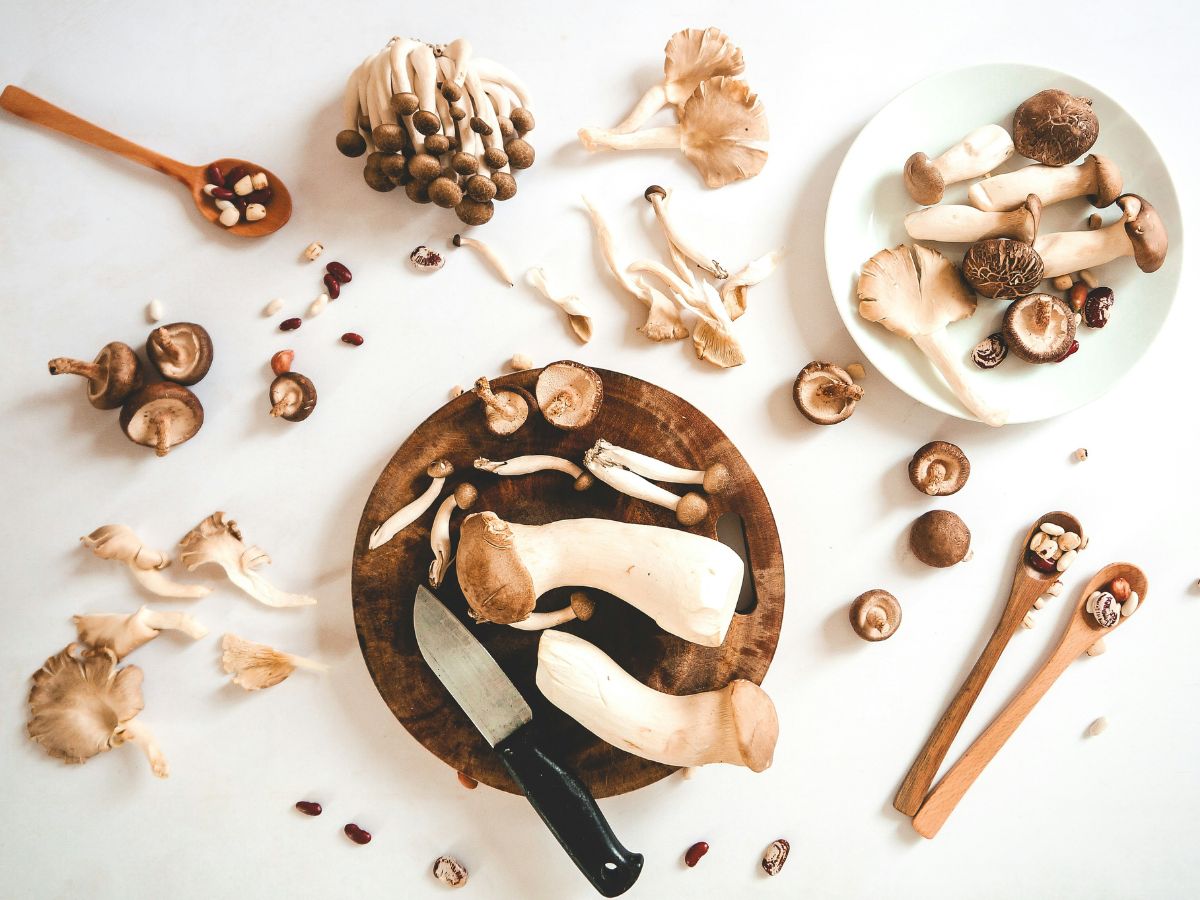
How Mushrooms Support the Immune System
The polysaccharides and lectins in mushrooms can boost the immune system’s performance in the gut by regulating its activity.
Beta-glucans are a type of polysaccharide found in mushrooms, especially varieties like shiitake and reishi. They support the immune system by improving its response to infection and disease.
Acting like little helpers for your immune system, beta-glucans stimulate the activity of immune cells such as macrophages, natural killer cells, and dendritic cells, enhancing the body’s defense against infections and diseases.
Research has revealed how beta glucan positively affects digestion, which can fight heart disease and improve cholesterol levels. The beta-glucans in mushrooms help fight bacteria, viruses, and tumors and prevent infections. (3)
Certain mushrooms also exhibit antimicrobial properties, which can help inhibit the growth of harmful bacteria, viruses, and fungi. Compounds like lectins and specific peptides found in mushrooms show the potential to disrupt the growth and survival of pathogens, supporting the body’s natural defense mechanisms.
Pictured above: Best Chicken Marsala (inspired by Ina Garten)
Which Mushrooms Deliver the Most Gut Health Benefits?
Several mushrooms offer notable gut health benefits due to their unique nutritional profiles and bioactive compounds. Some of the mushrooms known for their gut health benefits include:
- Shiitake mushrooms: Rich in beta-glucans and polysaccharides, shiitake mushrooms have potent immunomodulatory properties that support gut health by promoting a balanced immune response and modulating the gut microbiota. They also contain eritadenine, a compound that may help regulate cholesterol levels.
- Maitake mushrooms: Like shiitake mushrooms, maitake mushrooms are high in beta-glucans, which have prebiotic effects and can enhance the growth of beneficial gut bacteria. They also contain antioxidants that help reduce inflammation and support overall immune function.
- Reishi mushrooms: Reishi mushrooms contain bioactive compounds called triterpenes and polysaccharides, which have been shown to modulate the gut microbiota and support immune health. They also possess anti-inflammatory and antioxidant properties that contribute to overall gut well-being.
- Lion’s mane mushrooms: Lion’s mane mushrooms contain compounds called hericenones and erinacines, which have neuroprotective effects and may help support cognitive function and mood through the gut-brain axis. Additionally, they have been shown to promote the growth of beneficial gut bacteria and support digestive health.
While some mushrooms like those above are particularly gut-friendly, all varieties of mushrooms are low in calories and fat, and contain fiber and various nutrients.
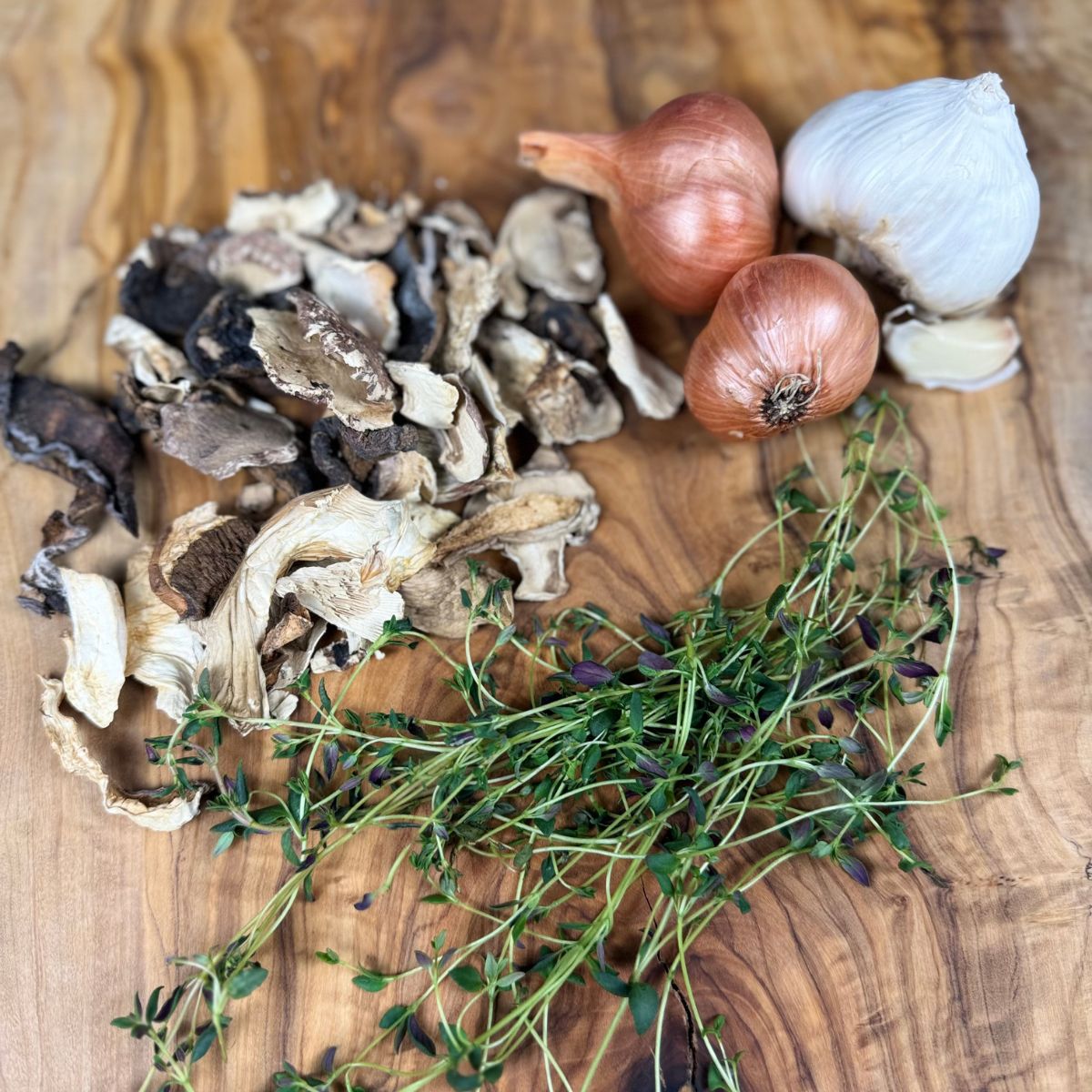
How Mushrooms Add to the Diversity of Gut Microbiota
Some research suggests that mushrooms can positively influence the composition and diversity of the gut microbiota, leading to a more balanced and resilient microbial community (4). Some experts refer to this as “modulating the gut microbiota”.
The more we can positively impact the composition, diversity, and activity of the microbial community in our gut, the better off we’ll be. Understanding the role of gut flora is crucial in this context, as it supports overall gut health and immune function.
The bioactive compounds in mushrooms, including polysaccharides and phenolic compounds, can modulate the gut environment. These compounds create conditions that favor the growth of beneficial bacteria and inhibit the growth of harmful pathogens. The result is a more diverse and balanced gut microbiota.
Why is it Important to Maintain a Healthy Gut Microbiome?
Maintaining a healthy gut microbiome is crucial for several reasons:
- Digestive health: A diverse and balanced gut microbiota helps break down food, absorb nutrients, and produce essential vitamins and enzymes for proper digestion. If you have a leaky gut, the nutrients you ingest flush down the toilet (literally).
- Immune function: The gut microbiome plays a major role in regulating the immune system. A healthy gut microbiota helps train the immune system to distinguish between harmless antigens and pathogens, reducing the risk of autoimmune diseases and infections.
- Mental health: Emerging research suggests a strong connection between the gut and the brain, known as the gut-brain axis. A healthy gut microbiome may help regulate mood, cognition, and behavior, with imbalances linked to depression, anxiety, and stress.
- Metabolic health: The gut microbiota influences metabolism and energy regulation, affecting weight management and the risk of metabolic disorders such as obesity, type 2 diabetes, and cardiovascular disease.
- Inflammation and disease prevention: A healthy gut microbiome helps maintain a balanced inflammatory response, reducing the risk of chronic inflammation and associated diseases like inflammatory bowel disease (IBD), rheumatoid arthritis, and certain cancers.
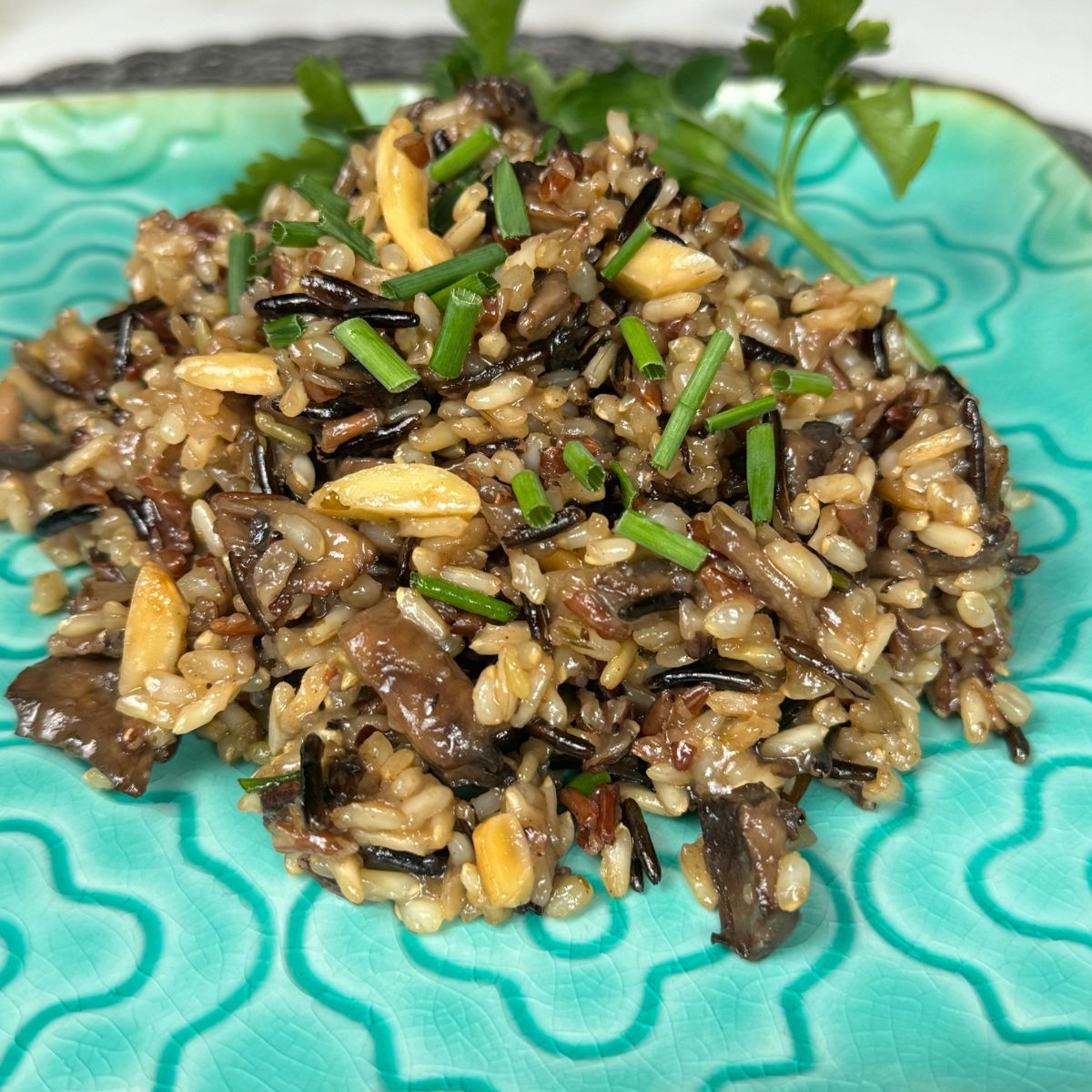
Above: Flavorful Mushroom Wild Rice.
How to Incorporate Mushrooms In Your Diet
There are numerous delicious and versatile ways to incorporate mushrooms into your diet:
- Sautéed or Stir-Fried: Add sliced mushrooms to stir-fries, pasta dishes, or vegetable medleys for extra flavor and texture.
- Grilled or Roasted: Grill or roast whole mushrooms or mushroom caps seasoned with herbs and spices for a savory side dish or burger topping. Try this Grilled Vegetable Salad which includes mushrooms.
- In Sauces: Incorporate mushrooms into your favorite sauces to add a punch of nutrition and flavor to proteins or pastas. Try this indulgent Chicken Marsala recipe (inspired by Ina Garten).
- In Egg Dishes: Incorporate sautéed mushrooms into omelettes, frittatas, quiches, or egg bites for a protein-packed breakfast or brunch option. Kale and Mushroom egg bites are great for a delicious breakfast at the table or on the go.
- Mushroom Wild Rice: Bring wild rice to life with chopped mushrooms along with broth and your favorite seasonings. Try this Mushroom Wild Rice recipe.
- Stuffed Mushrooms: Fill mushroom caps with a mixture of cheese, herbs, breadcrumbs, or sausage for a delicious appetizer or snack.
- Mushroom Soup: Make a hearty mushroom soup by sautéing mushrooms with onions, garlic, and herbs, then simmering them in broth until tender.
- Mushroom Tacos or Wraps: Use seasoned mushrooms as a filling for tacos, wraps, or burritos along with your favorite toppings like salsa, avocado, and cheese.
- Mushroom Salad: Add sliced raw or cooked mushrooms to salads for an earthy flavor and meaty texture.
Does Drying or Cooking Mushrooms Reduce Their Health Benefits?
Researchers have studied the impact of drying mushrooms on their nutritional and phytochemical composition. One study saw a higher concentration of phenolics, proteins, and carbohydrates in dried mushrooms (due to loss of moisture), but a decrease in lipids. Also, they observed a positive impact on the nutrient and phytochemical composition of the mushrooms. (5)
This 2023 study published in Foods explored the effect of different cooking methods on the bioactive components (total phenol, total flavonoid, crude polysaccharides, and eritadenine), specifically in shiitake mushrooms. 6 It showed that oven baking showed the highest contents of total phenolics and total flavonoids, and the lowest losses of crude polysaccharides and eritadenine. Steaming, boiling, and air frying could decrease the contents of all four of the bioactive components.
Sources:
1. Jiahui Zhao, Yixin Hu, Chao Qian, Muhammad Hussain, Shizhu Liu, Anqiang Zhang, Rongjun He, and Peilong Sun, “The Interaction between Mushroom Polysaccharides and Gut Microbiota and Their Effect on Human Health: A Review”, Biology; 12(1): 122 (2023). https://www.mdpi.com/2079-7737/12/1/122
2. Sechul Chun, Judy Gopal, Manikandan Muthu, “Antioxidant Activity of Mushroom Extracts/Polysaccharides — Their Antiviral Properties and Plausible AntiCOVID-19 Properties”, Antioxidants, 10(12), 1899 (2021) https://www.mdpi.com/2076-3921/10/12/1899
3. ACS Laboratories Blog, Elena Schmidt, “The Powerful Benefits of Beta-Glucans in Functional Mushrooms”, March 28, 2023. https://www.acslab.com/mushrooms/beta-glucans
4. Changxia Yu, Qin Dong, Mingjie Chen, Ruihua Zhao, Lei Zha,Yan Zhao, Mengke Zhang, Baosheng Zhang, andAimin Ma, “The Effect of Mushroom Dietary Fiber on the Gut Microbiota and Related Health Benefits: A Review”, Journal of Fungi, 9(10), 1028 (2023) https://www.mdpi.com/2309-608X/9/10/1028
5. Tsungai Reid, Merjury Munyanyi, Takafira Mduluza, “Effect of cooking and preservation on nutritional and phytochemical composition of the mushroom Amanita zambiana”, Food Science and Nutrition, 2016 https://onlinelibrary.wiley.com/doi/10.1002/fsn3.428
6. Fen Yao, Hong Gao, Chao-Min Yin, De-Fang Shi, Xiu-Zhi Fan, “Effect of Different Cooking Methods on the Bioactive Components, Color, Texture, Microstructure, and Volatiles of Shiitake Mushrooms,” Foods, 12(13), 2573 (2023) https://www.mdpi.com/2304-8158/12/13/2573

